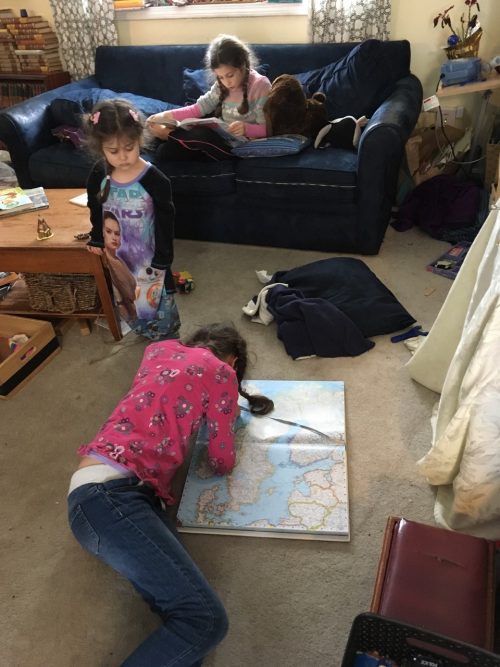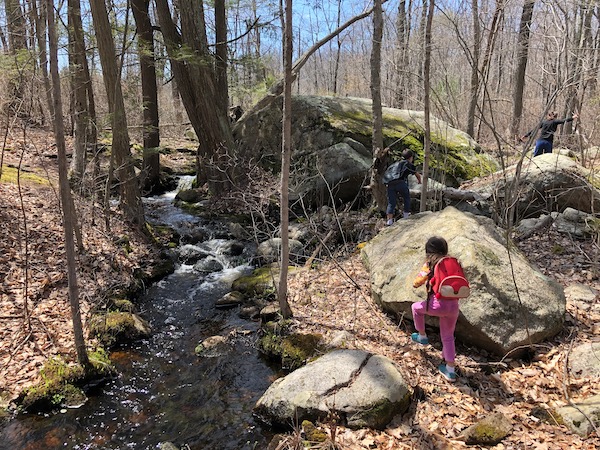
I don’t read many homeschool blogs these days and those I do read tend to be blogs by people who happen to homeschool and sometimes write about homeschooling but often write about all sorts of other interesting things. But a few different pieces have come across my path in the past few days and they’ve all been playing with each other in my mind, so I thought I’d try to pull together some thoughts that are bouncing around.
It’s helpful every now and then in the long homeschooling march to step back and consider the bigger picture. And perhaps especially in February when things feel rather bleak and tedious.
1.
Mrs Darwin of Darwin Catholic: Play to Your Strengths
I had a chance to talk to Bearing when her family visited us over New Year’s, and she made a remark that stayed with me: Each homeschooling family is running a magnet school, focused on their own interests. Some families are going to be big on scientific experiment and field trips. Some families like structure and are very good at sticking to a plan and getting prescribed work done on a schedule. Some families love literature and art. Some excel at hands-on stuff. And that’s fine. My homeschool doesn’t have to look like your homeschool, which doesn’t have to look like her homeschool. That’s why specific advice is often unhelpful, because it grows out of one family’s particular way of functioning.
I really love this idea of a magnet school, of not being ashamed at being particularly strong in one area and not worrying that my family doesn’t look like anyone else’s. I also love her exhortation to do what you love:
If you love something, that’s probably a good sign that you should be incorporating it into your homeschooling as much as possible. And the things you don’t love, but you know you need to be doing anyway: we’re still working on that.
Like Mrs Darwin, My strengths are reading aloud and an appreciation of and a deep knowledge of good literature. I think I’m also particularly strong in art appreciation, dragging kids to museums and looking at paintings and sculptures with them, discussing them, and also diving into art via books and the web.
I love reading aloud and unless I’m sick I can read for hours on end. For me reading aloud is a treat to look forward to, and not only the reading but also the discussion. Literature is the spine of our homeschool, everything hangs off of it, but it’s also the heart, the place we love to be. We have a big pile of books that lives on the windowsill and reading them is the cornerstone of our day, though I do it after lunch, not first thing in the morning, because for years that was the toddler’s nap time and it’s the time of day when I most need to be sitting down.
I think I’m good at field trips, especially museums, though we seem to do them about one or two every other month. Certainly I’m very happy spending times in museums. I think the MFA is one of my happy places and sometimes I feel that I could gladly follow in the footsteps of Claudia in From the Mixed-up Files of Mrs. Basil E. Frankweiler and very happily live in the museum. I’m not great at getting everyone out the door without a lot of planning and it drains us enough that we can’t do them too frequently, but we do get out and go to cool places and my kids do well in museums and touring old houses and the like. So that would definitely be something I love that we should do as much as possible.
I’m not very good at hands-on, at science lab sorts of things. I’m not good at schedules and being organized. I’m good at having a basic plan and going with the flow, at improvising and being relatively spontaneous. I’m good at making connections, at pulling together art and music and history books, picture books, and field trips that compliment the main thrust of our history study. And I’m good at pausing to ponder questions, at looking things up, at following rabbit trails to see where they lead.
Sometimes I do wonder if I’m doing enough, if my lack of structure and organization isn’t a Very Bad Thing. but then my 10 year old spends a morning poring over the atlas and I think: she’s probably fine doing what she’s doing, why rock the boat?
I do think I am good at helping my kids to follow their passions, at seeing possible ways their interests can become paths to explore, and at finding resources to help them go deeper.
2. Erin of Bearing Blog is in many ways my opposite when it comes to homeschooling styles. She’s organized and structured and very good at the sciences and at hands-on learning. But rather than making me feel inadequate, she usually inspires me. I love the way she writes and ponders. This week her planning and thinking about the needs of one particular child, Planning again, and the problem of the lonely 7yo., led to this interesting insight into how a homeschooling family thrives:
All along I am guided by my philosophy that we are part of a family that learns together first, that it’s balancing the needs of the family as a whole that has to happen from year to year, and that each individual has to give sometimes and take some times. I literally cannot optimize each individual child’s education — not overall and not in any one year. I can try to meet many goals for each child in a way that is adequate for all, and in which our whole family can — one way or another — thrive.
There are surprises around every corner, too. Best make room for them when they come.
I really like the way she frames this: the goal is for the whole family to thrive. And this is something that I’ve definitely seen playing out in our own homeschool that sometimes balancing the various needs means the curriculum might not be maximized for each individual child. Things were much more flexible and adaptable when Bella was my one and only school-aged child. We were abl to follow her interests much more closely in ways I cannot do with Sophie, Ben, and Anthony. And in some ways I’m simply not as attuned to what their passions might be. Not that I am not paying attention, but that they’re very different children who communicate in different ways and none of them are quite as transparent to me as Bella is nor so voluble.
Anyway, I think this is one place where playing to your own strengths as a teacher comes in. There are so many hours in the day, we all have to get through the work so that each child is making progress and we are all thriving. How I balance the needs of the individuals and the needs of the family, how I play to my own strengths as a teacher and their own strengths as learners, that’s a balancing act. But I think it’s worth taking time to consider my strengths as a teacher and how they create a culture that’s specific to our family which will look different than any other family’s culture and how that in itself gives everyone room to thrive.
3. A rather unfortunate title, but I liked the content pretty well, Brandy of After Thoughts (not a blog I read regularly, but someone shared this piece and it seemed to dovetail nicely with my consideration of the other two): Are You Sabotaging Your Charlotte Mason Homeschool?
Charlotte Mason believed in the ability of teachers and parents to wisely apply her principles as they saw fit (see the preface to Volume 2, for example). She warned us against systematizing education. And yet it’s so tempting — our world promotes the factory model and we are tempted to believe that we can put the children on the conveyor belt on one end and then Do All The Things Precisely along the way and then out will pop the Properly Educated Child at the end. It’s easier to focus on Doing The Things Precisely (and Mechanically) rather than thoughtfully implementing principles.
Conform our ways to Charlotte Mason’s principles and each family will look a little different as they blossom and grow. But decide on an absolute standard of doing all the details, and that’s a different kind of conformity altogether, and some families will feel stifled while others will feel like failures and yet others will feel smug. And none of it is pretty, and none of it requires the use of our brains.
Remember Charlotte Mason’s exhortation? Mix our work with brains.
I spent a lot of time researching homeschooling philosophies and methods way back when I was pregnant with Bella and when she was a baby. I read books and blogs and more blogs. And I found a very strong affinity with Charlotte Mason’s philosophy and pedagogical method. Of all the approaches, hers is the one I most identify with and cling to. And I follow the Mater Amabilis Fb group (The Catholic Charlotte Mason curriculum) and am often haunting the conversations there. And yet when it comes down to it, I raid their booklists, I implement many of Charlotte Mason’s approaches (we do daily copywork, I make stabs at narration and dictation and nature walks), and yet I don’t follow their schedules or plans directly.
Part of that is my allergy to schedules. I don’t want to make a schedule of my own that I feel bound to stick to rigidly much less follow someone else’s curriculum and schedule. And part of it is that I found the Story of the World books before I found Mater Amabilis and I committed myself to a four year cycle of history with those books as a spine. They work for us and I see no reason why I should give up what’s already working well enough.
So what we do isn’t strictly Charlotte Mason, I supposed. But I find her principles helpful in the main, while still thinking some of them are a bit baffling. I take what works for me and leave the rest, though I do keep coming back to poke through the pile of leftovers to see if there might be any more useful bits that I overlooked before.
Most of all I like the back and forth of the conversation, the stimulating world of ideas and practical questions that I find in the groups, so I keep coming back to Charlotte Mason even if I sometimes feel a little bit like an imposter for not sticking more closely to the method.
When I spend too much time looking at what all the other homeschoolers are doing I start to doubt myself, but when I look at my kids and how our family is thriving, then I’m usually pretty sure we’re on the right track. I’m so glad that early on I met up with Melissa Wiley and the rest of the unschooling-ish gang and found the leavening that helps me notice the learning that is already happening, helps me to follow the lead of the actual children in front of me, and helps me to be attentive to their needs, to carefully strew their environment with the tools they need to teach themselves so that learning in our home really is an environment and an atmosphere and a life as much as, or perhaps even more than, it is an organized curriculum.







Aw. What nice words.
I love that you know your strengths. And reading aloud as much as you do is definitely a gift! I find myself wishing my kids would hurry up and read already so that we could talk about books without spending days with me reading aloud (and nodding off sometimes in the process).
Nodding off in the process is definitely frustrating.